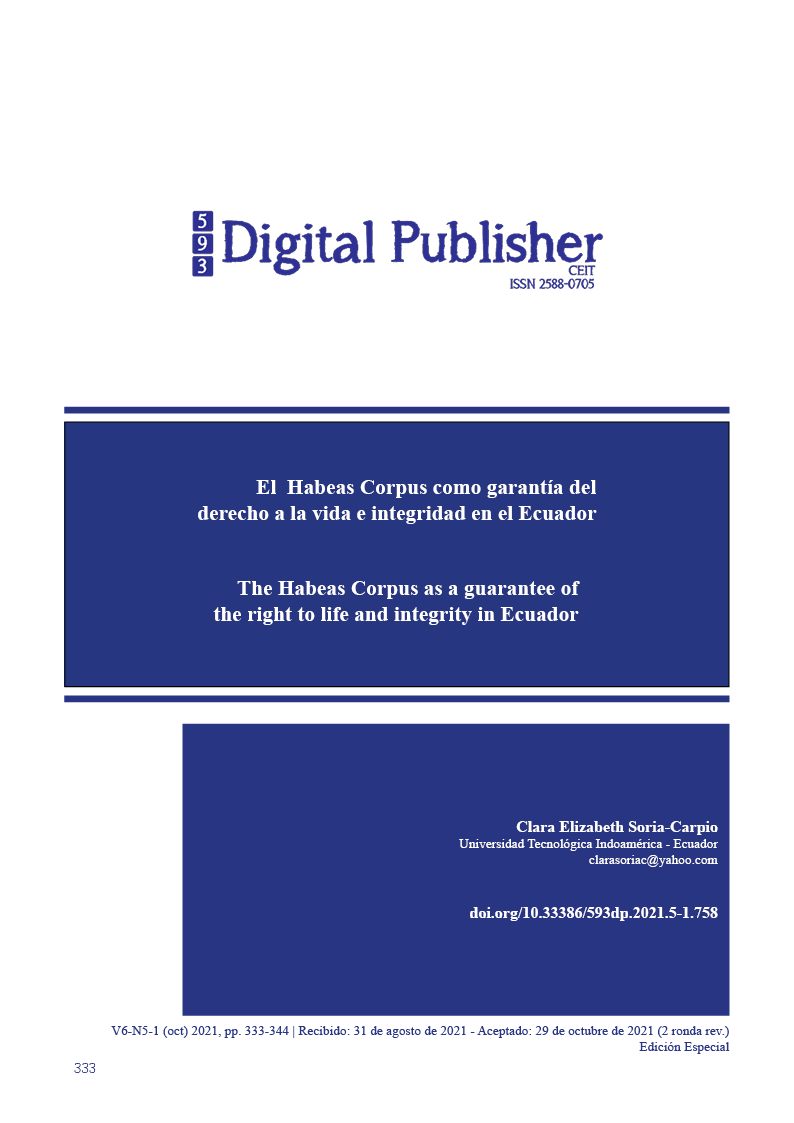The Habeas Corpus as a guarantee of the right to life and integrity in Ecuador
Main Article Content
Abstract
This essay seeks to present an approach to the habeas corpus action as an adequate and effective guarantee against the violation of the right to life and physical integrity of people incarcerated in Ecuador. Normatively, the so-called corrective habeas corpus has been established for more than ten years in the Ecuadorian constitutional regime. However, it has been considered from a traditional conception: an action that seeks to verify if the deprivation of liberty is illegal, illegitimate or arbitrary.
The constant jurisprudential updating developed by the Constitutional Court proposes new challenges to society, lawyers and judges, since it has established the first practical parameters to consider in the face of undeniable violations of the integrity of people deprived of liberty and, at the same time, habeas corpus has been ratified as an adequate and effective guarantee to protect the life and integrity of imprisoned people.
Downloads
Article Details

This work is licensed under a Creative Commons Attribution-NonCommercial-ShareAlike 4.0 International License.
1. Derechos de autor
Las obras que se publican en 593 Digital Publisher CEIT están sujetas a los siguientes términos:
1.1. 593 Digital Publisher CEIT, conserva los derechos patrimoniales (copyright) de las obras publicadas, favorece y permite la reutilización de las mismas bajo la licencia Licencia Creative Commons 4.0 de Reconocimiento-NoComercial-CompartirIgual 4.0, por lo cual se pueden copiar, usar, difundir, transmitir y exponer públicamente, siempre que:
1.1.a. Se cite la autoría y fuente original de su publicación (revista, editorial, URL).
1.1.b. No se usen para fines comerciales u onerosos.
1.1.c. Se mencione la existencia y especificaciones de esta licencia de uso.
References
Castro, Á., Cillero, M., & Mera, J. (2010). Derechos Fundamentales de los Privados de Libertad, Guía Práctica con los Estándares Internacionales en la Materia. Ediciones Universidad Diego Portales.
Cordero Heredia, D., & Yépez Pulles, N. (2015). Manual (crítico) de Garantías Jurisdiccionales Constitucionales. Comunicaciones INREDH.
Costa Rica, Corte Interamericana de Derechos Humanos. (2004, septiembre 2). Caso Instituto de Reeducación del Menor vs. Paraguay.
Ecuador. (2008, octubre 20). Constitución de la República del Ecuador [Registro Oficial No. 449].
Ecuador, Asamblea Nacional. (2009, octubre 22). Ley Orgánica de Garantías Jurisdiccionales y Control Constitucional [Registro Oficial. Suplemento No. 52].
Ecuador, Asamblea Nacional Constituyente. (2008). Constitución de la República [Registro Ofi- cial No. 449].
Ecuador, Corte Constitucional. (2018). Sentencia No. 017-18-SEP-CC. Caso N.° 513-16 - EP.
Ecuador, Corte Constitucional. (2021). Sentencia No. 365-18-JH y acumulados. Corte Constitu- cional, Juez Ponente: Agustín Grijalva Jiménez.
Ecuador. Corte Constitucional del Ecuador. (2019, noviembre 12). Sentencia No. 209-15-JH/19 y (acumulado). Caso No. 209-15-JH y 359-18-JH (acumulado).
Silva Portero, C. (2008). La tortura y los tratos o penas crueles, inhumanos y degradantes su pre- vención durante la privación de la libertad. En Ejecución Penal y Derechos Humanos, una Mirada Crítica a la Privación de Libertad. Ministerio de Justicia y Derechos Humanos.


